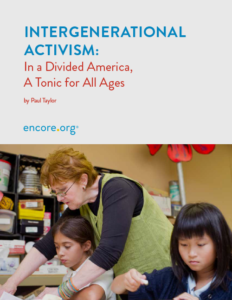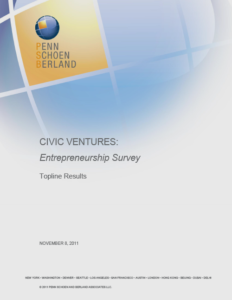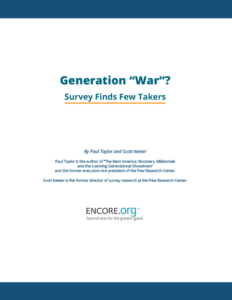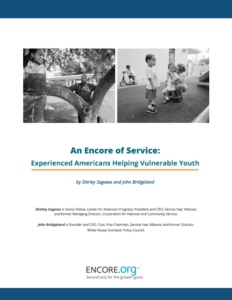All Research Reports
The Power and Purpose of Informal Community Leaders
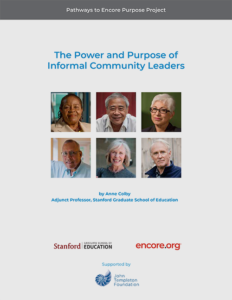 In 2017, when Encore and researchers from the Stanford Graduate School of Education were beginning the Pathways to Encore Purpose project, Anne Colby, a psychologist at the Stanford University Graduate School of Education who has studied purpose across the life cycle, interviewed Hanmin Liu, co-founder of Wildflowers Institute, who made connections to informal elder leaders from three diverse Bay Area communities. “The Power and Purpose of Informal Community Leaders,” tells the stories of these community leaders and illustrates how each exemplifies purpose beyond the self, reveals the joy they gain from this work for the common good, and shows how the commitments of individuals can help create shared collective purpose in their communities.
In 2017, when Encore and researchers from the Stanford Graduate School of Education were beginning the Pathways to Encore Purpose project, Anne Colby, a psychologist at the Stanford University Graduate School of Education who has studied purpose across the life cycle, interviewed Hanmin Liu, co-founder of Wildflowers Institute, who made connections to informal elder leaders from three diverse Bay Area communities. “The Power and Purpose of Informal Community Leaders,” tells the stories of these community leaders and illustrates how each exemplifies purpose beyond the self, reveals the joy they gain from this work for the common good, and shows how the commitments of individuals can help create shared collective purpose in their communities.
Making the Case for Intergenerational Childcare: How Adults 50+ Can Support Home-Based and Family Childcare Centers
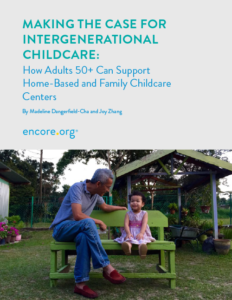 This paper will examine the meaningful roles that adults 50+ can play to help improve the quality of childcare for young children 0-5. It will show that intergenerational approaches to child care have the potential to create brighter futures for currently underserved youth; benefit older adults seeking purpose, income and connection; and unlock doors to economic prosperity for small business owners (mostly low-income women of color) currently running home-based and family childcare centers.
This paper will examine the meaningful roles that adults 50+ can play to help improve the quality of childcare for young children 0-5. It will show that intergenerational approaches to child care have the potential to create brighter futures for currently underserved youth; benefit older adults seeking purpose, income and connection; and unlock doors to economic prosperity for small business owners (mostly low-income women of color) currently running home-based and family childcare centers.
Intergenerational Activism: In a Divided America, a Tonic for All Ages
Encore Entrepreneurs – Topline Results
A Future of Purposeful Aging
Hidden in Plain Sight: How Intergenerational Relationships Can Transform our Future
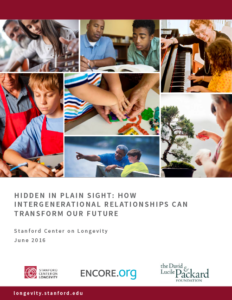 In June 2014, the Stanford Center on Longevity, Encore.org and the David and Lucile Packard Foundation joined together to convene the “Pass it On” conference of national experts, to explore how experienced adults can play critical roles in the lives of our children and youth, and to elevate generativity as a norm for the second half of life. This monograph builds on the key recommendations that emerged from the “Pass it On” conference to propose practical strategies for engaging encore talent to meet the needs of youth. It explains what organizations and communities can do, and encourages leaders and individuals alike to support and join efforts to mobilize experienced adults to work with children and youth. Two demographics — children in need of support and adults with the time and inclination to step into roles that provide it — fit together like the pieces of a jigsaw puzzle.
In June 2014, the Stanford Center on Longevity, Encore.org and the David and Lucile Packard Foundation joined together to convene the “Pass it On” conference of national experts, to explore how experienced adults can play critical roles in the lives of our children and youth, and to elevate generativity as a norm for the second half of life. This monograph builds on the key recommendations that emerged from the “Pass it On” conference to propose practical strategies for engaging encore talent to meet the needs of youth. It explains what organizations and communities can do, and encourages leaders and individuals alike to support and join efforts to mobilize experienced adults to work with children and youth. Two demographics — children in need of support and adults with the time and inclination to step into roles that provide it — fit together like the pieces of a jigsaw puzzle.
Generation “War”? Survey Finds Few Takers
An Encore of Service: Experienced Americans Helping Children and Youth
Doing Good By Doing Well: Encore Fellows™ Build Nonprofits’ Capacity to Serve Children and Youth
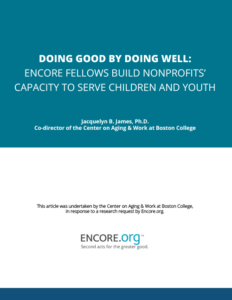 To better understand how Encore Fellows deliver impact in the organizations in which they serve (usually 1000 hours over a one-year period in stipended roles to improve organizational capacity, Jacquelyn James, Co-director of the Center on Aging & Work at Boston College, interviewed fellows, executive directors and other key staff at three organizations across the U.S. that worked on issues advancing the needs of children and youth. The study highlights commonalities among these three organizations in how bothfellows and the nonprofit leadership approached the fellowship, with exceptional impact for the organizations and fellows alike.
To better understand how Encore Fellows deliver impact in the organizations in which they serve (usually 1000 hours over a one-year period in stipended roles to improve organizational capacity, Jacquelyn James, Co-director of the Center on Aging & Work at Boston College, interviewed fellows, executive directors and other key staff at three organizations across the U.S. that worked on issues advancing the needs of children and youth. The study highlights commonalities among these three organizations in how bothfellows and the nonprofit leadership approached the fellowship, with exceptional impact for the organizations and fellows alike.
The Encore Talent Impact Project: A Study of Encore Talent at Work
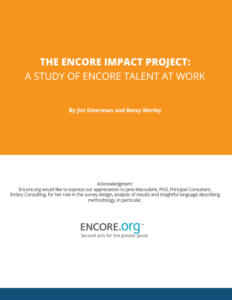 In 2015 Encore.org and six study partners surveyed nonprofit organizations that had used people in encore roles and asked about the kinds of impact they had observed and the personal characteristics of the individuals that might have contributed to that impact. The results – from volunteers to stipended roles, people in encores deliver unexpected types of impact across the board.
In 2015 Encore.org and six study partners surveyed nonprofit organizations that had used people in encore roles and asked about the kinds of impact they had observed and the personal characteristics of the individuals that might have contributed to that impact. The results – from volunteers to stipended roles, people in encores deliver unexpected types of impact across the board.

